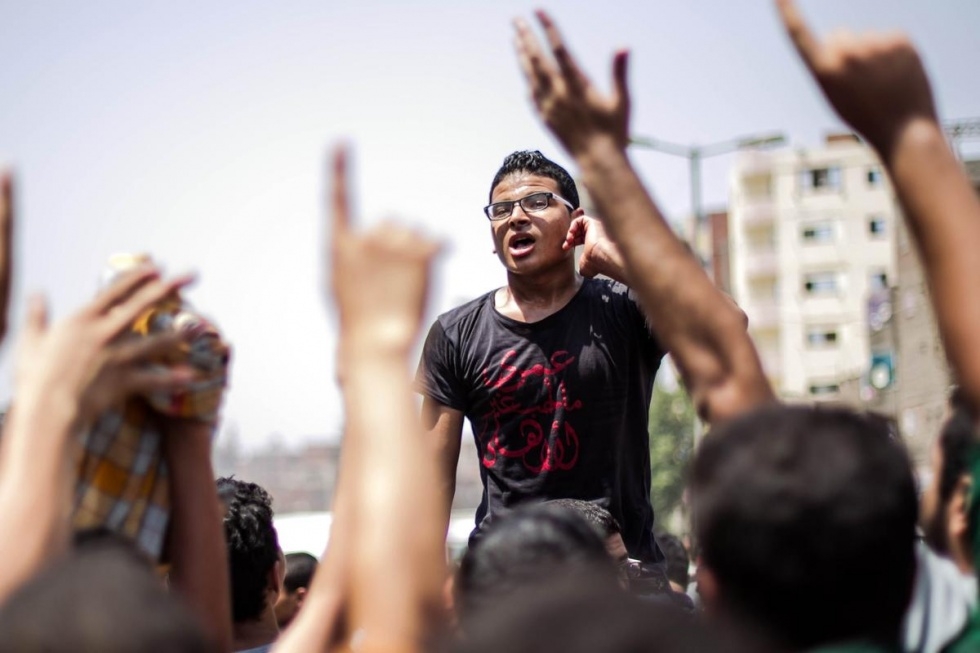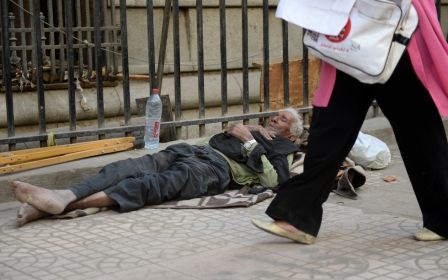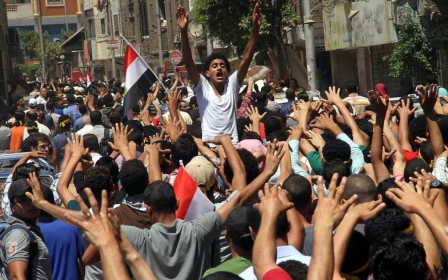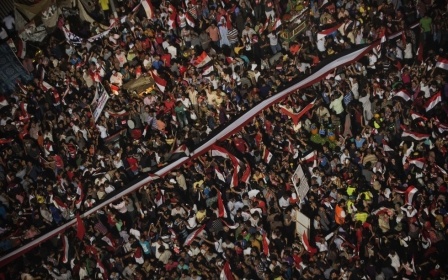A bitter year: Egypt after the coup

The first anniversary of 30 June and 3 July passed without celebrations worthy of a “revolution.” Between June 2013 and June 2014, what happened to the “30 million” people who took to the streets in “the largest” demonstration in Egypt’s modern history? Where do the forces that took part in removing an elected civilian president stand today?
If anything, this one year has been bitter for democracy, the rule of law and human rights. It underscored the downsides of falling under military rule: complete disregard for due process, norms, standards and fundamental rights. On 3 July, the military - which never left the scene since the toppling of Mubarak - resurfaced to the forefront to draw the lines of the battle regarding Egypt’s future: return of police state vs. democracy; authoritarianism and repression vs. freedom and regard for human rights; counter-revolution vs. revolution and restructuring.
One year after the military takeover on 3 July, the political landscape of the country seems totally altered, with parties and political forces shifting positions. What has become of the liberal opposition and their aspirations to build a democratic coalition? Are youth and revolutionary movements still currently relevant in the power equation? What prospects do the Islamists have in regaining popular support? What lessons has everyone learned, and finally, who will have the last say in this ongoing struggle?
Perhaps one of the most visible observations looking at the past year, is that no force in Egypt currently has the power to mobilize the masses anymore. On 26 July, 2013, General Abdel Fattah al-Sisi asked the Egyptian people to give him a “mandate” to fight potential terrorism.
Huge numbers of Egyptians poured into the streets in his support. This might have been Sisi’s peak of popularity, as now he is now faced with the challenge of delivering all the promises made to the millions who gave him a chance. So far, he has been unable to turn the economy around, restore stability and improve the standard of living of most Egyptians. Instead, he has been crushing expectations and burdening people with additional taxes. In addition, he has been instrumental in the removal of subsidies, while increasing the financial allocations of the military.
The Muslim Brotherhood and its allies, as well as smaller revolutionary groups, have been participating in ongoing demonstrations, protests and stands. So far they have all failed to reach out beyond their constituency and mobilise larger segments of the population as was the case in January 2011. The military-backed government as well, has demonstrated its inability to generate public support, made evident by the strikingly low turnout in the constitutional referendum and presidential elections last January and May, respectively.
Who has the ability then, to harness the people’s power and defeat the counter-revolution? This is a tough question, particularly since many Egyptians seem weary of politics, frustrated and apathetic, losing hope in all existing political parties, and surrendering their will to the military general and the institution behind him. As someone put it, in a way, 30 June, for many, was a “demonstration to end all demonstrations.”
30 June coalition
The liberal parties, most coalescing under the National Salvation Front and vehemently opposed to President Morsi, provided a political cover to the military to remove the first democratically elected civilian president and end the democratic transition. Of course, they expected the military to hand power over to them, or at least to find a place in the new regime. A year later, Sisi has rid himself of his previous allies and the NSF has disintegrated, disgracefully losing credibility and legitimacy.
Tamarud, the movement that publically instigated the anti-Morsi campaign leading to 30 June had little role in directing the course of events over the past year. As all political powers, it has lost the ability to mobilise, and its leaders have become consumed by internal conflicts. Tamarud’s ties to the military establishment were revealed, utterly discrediting the group.
Mahmoud Badr, one of the leaders of the movement, announced that they plan on turning into a political party in preparation for the parliamentary elections. It is doubtful that they would be able to attract the revolutionary youth or appeal to other segments, for that matter.
The revolutionaries
The first anniversary of the coup comes while iconic figures of the 25 January revolution are in prison. With the counter-revolution in power, the military regime is making sure to punish everyone who participated in the 25 January revolution. Alaa Abdel Fattah, Ahmed Maher, Mohamed Adel, Mahienour El Masry and Sanaa Seif’s true offense is that they once dreamt of a democratic and free Egypt and of a better future. The April 6 movement that participated on 30 June and was initially silent about 3 July but later opposed it, found itself legally banned in April 2014. With two of its top leaders in prison, the movement is struggling to sustain its activities.
The Front of Thuwar was established in September 2013, after the Rabaa Massacre to carve an alternative path, strongly opposed to the military and at the same time critical of the Muslim Brotherhood’s rule. With more than 40,000 people detained, the front’s main activity shifted focus from a revolutionary path to mere survival. It now works on defending political prisoners, organising media campaigns to raise awareness about their cases, and providing them with legal and financial support.
None of those who supported 30 June- and demanded early elections - have celebrated the first anniversary. Others clearly expressed remorse for playing into the hands of Tamarud. But remorse is not enough to restore social peace to Egypt. As they put serious efforts to remove an elected civilian president and help deliver the country to the old police state, they need to make equal efforts to challenge the current repressive regime, defend human rights, and side with the youth who have been under brutal attack.
The Muslim Brotherhood
Finally, the Muslim Brotherhood and its Islamist allies seem to be the more organised group one year after the coup, despite the severe blow they suffered. While sustaining a massive crackdown on its leadership, rank and file, the movement has been able for an entire year to organise almost daily protests and rallies. Despite ruthless demonisation, media-led hatred campaigns, and direct calls for eradication, the MB is still able to retain the support of millions and the sympathy of those who are enduring deep injustice. However, no political vision has crystalized on how to move beyond that. Unless the MB develops an inclusive rhetoric that builds bridges with other revolutionary counterparts, reaches out to the wider public, and produces a plan that acknowledges the past’s mistakes and provides alternatives for the future, little is to change on the ground. Demonstrations this time, unfortunately, are not enough to unseat a vindictive military ruler and brutal security machine.
The past year has been one of loss for all parties to varying degrees. The coup has succeeded in establishing a brutal regime. The increasing pressures on the emerging regime and its repugnant brutality, as well as the inevitable conflicts among its different factions, and rising public dissatisfaction, have also shown that this victory will not continue for long. The greater responsibility for those opposing the coup is to realise that bringing down a repressive regime might be easier than moving in the right direction. The real challenge is what lies next, a feat that no single party can solely manage.
- Emad Shahin is Professor of Public Policy, the American University in Cairo (AUC) and Editor-in-Chief, The Oxford Encyclopedia of Islam and Politics. He is currently a Public Policy Scholar at Woodrow Wilson Center and a Distinguished Visiting Scholar at Columbia University.
The views expressed in this article belong to the author and do not necessarily reflect the editorial policy of Middle East Eye.
Photo credit: Protests on 30 June in Cairo (AA)
New MEE newsletter: Jerusalem Dispatch
Sign up to get the latest insights and analysis on Israel-Palestine, alongside Turkey Unpacked and other MEE newsletters
Middle East Eye delivers independent and unrivalled coverage and analysis of the Middle East, North Africa and beyond. To learn more about republishing this content and the associated fees, please fill out this form. More about MEE can be found here.





